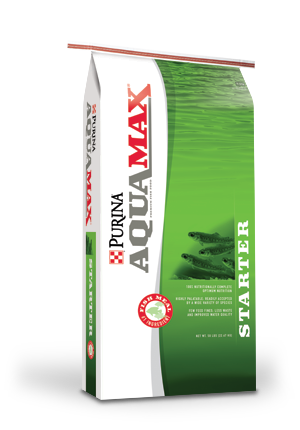
Description: 100% nutritionally complete for starting fish and early growth phases for both carnivorous and omnivorous species. Purina® AquaMax® Fingerling Starter 300 is a sinking product in a 1/16″ extruded pellet.
Species: Blue Gill, Catfish, Hybrid Striped Bass, Largemouth Bass, Tilapia, Trout
Type: Starter
Nutrient Analysis
Nutrient Min / Max Amount
Crude Protein MIN 50.00 %
Crude Fat MIN 16.00 %
Crude Fiber MAX 3.00%
Calcium (Ca) MIN 2.35 %
Calcium (Ca) MAX 2.85 %
Phosphorus (P) MIN 1.30 %
Sodium (Na) MAX 0.60 %
Feeding Directions
Description For starting fish and early growth phases, use Purina® AquaMax® carnivorous starter diets for both species groups. Purina® AquaMax® Starter diets are all designed as sinking rations and contain fish meal as the #1 ingredient. These highly-digestible diets enable fish to more efficiently utilize nutrients which, in turn, reduces fecal waste and biological load in water. A precision manufacturing process reduces the amount of fine feed dust materials, which helps maintain water quality by minimizing feed waste. In some species, excessive feed fines in water can lodge in fish gills and attract bacteria and fungus. By reducing these feed fines, Purina® AquaMax® provides an added health benefit to fish. For fish that have reached the fingerling stage, the product line separates into diet formulations most appropriate to the species group. Floating diets are recommended for the growing stage.
Caution Store in a dry, well-ventilated area protected from rodents and insects. Do not feed moldy or insect-infested feed to animals as it may cause illness, performance loss or death.
Management Practices Consumption can vary depending upon water temperature, season of the year, nutritional needs of the fish, availability of other foods and fish familiarity with particle feeds. Consult the feed tag on this package for specific feeding directions.
A feeding program is only as effective as the management practices followed. Actual results may vary depending upon feed intake, environmental conditions and the quality of management practices. An effective feeding maximizes feed conversion rates which helps minimize the risk of water quality degradation. However, it is necessary to follow good management practices and feed ONLY what the fish will consume. Excess feed increases the Biochemical Oxygen Demand (BOD) which over time, can contribute to the deterioration of your water quality. Adequate Dissolved Oxygen (D.O.) must be maintained for sport fishing ponds; aggressive feeding should be accompanied by an adequate aeration program.
